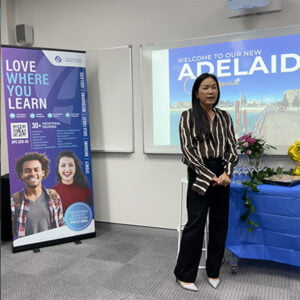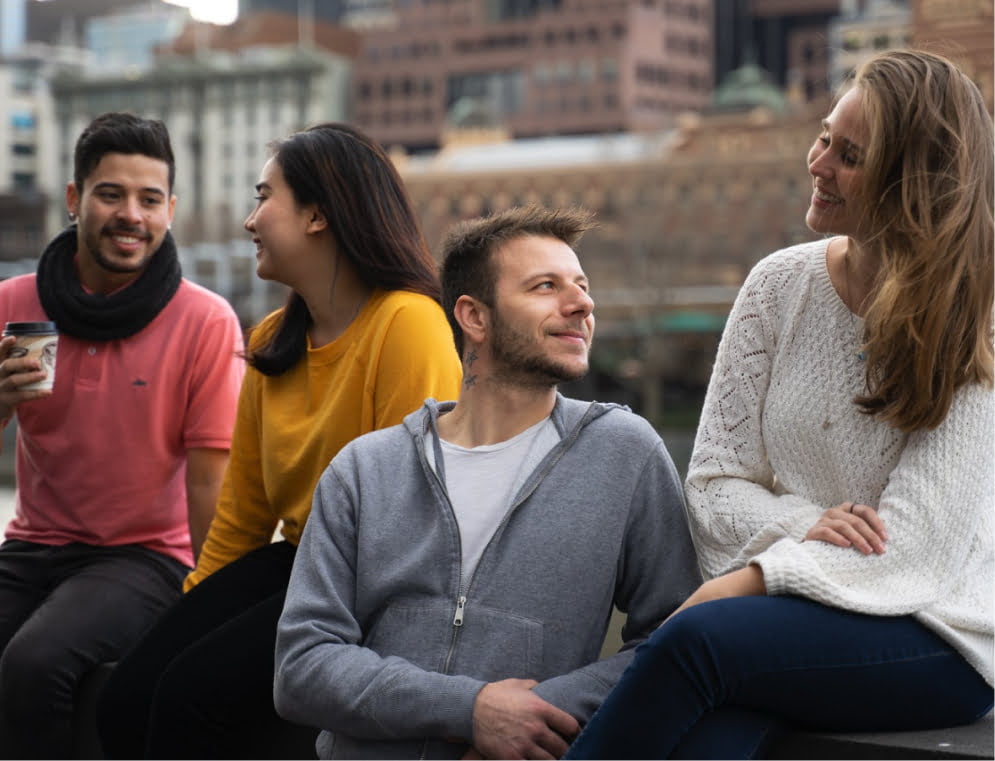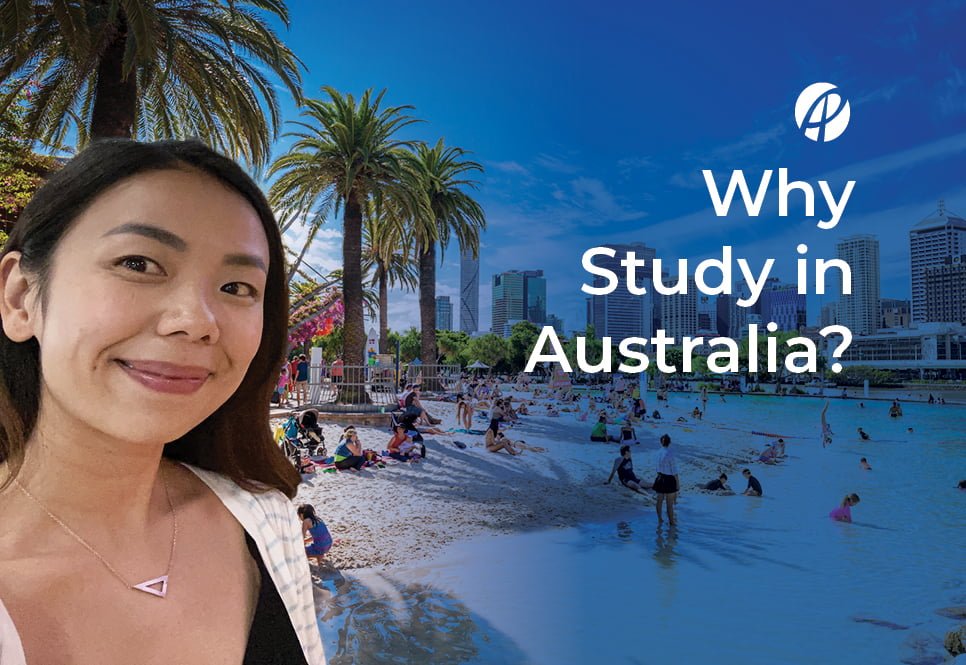The Importance of Knowing Your Why


Youngeun Song moved to Australia from South Korea as an international student in 2003. She started her career in Australia in 2004 and has since become APC Education Group’s Principal Executive Officer (PEO) in 2021. She is currently also completing a Graduate Diploma of Management (Learning) with APC. Although she questions how she found herself in this leadership role, she knows one thing for sure. Her desire to enrich the experiences of others has led her throughout her career. We recently spoke to Youngeun about the importance of knowing your why and the key to unlocking meaningful career growth.

How did you become a Principal Executive Officer at APC?
I ask myself this question all the time. Being a PEO wasn’t something that I was working towards. As a matter of fact, I’ve never had plans or aspirations for particular roles or climbing the corporate ladder. The movements in my career so far have been somewhat accidental, led by my ‘why’ more than what I wanted to become. I was running a successful business as an owner-operator of a kindergarten at a young age. The business opportunity fell into my lap which I grabbed with great excitement. There were plenty of challenges that kept my heart beating and producing adrenaline. However, 5 years later, I found myself going through the motions and frustrated by the traditional expectation of shaping children in certain forms. I became static. It was time for a reset. When I realised my plan of studying and returning home was out of the window, the new reality of staying in Australia for good settled in as I had started my family here. I wanted to understand myself as a professional, my strengths and weaknesses, and my purpose. I guess I was reforming my dream.
I’ve also always challenged existing norms and questioned traditions. When COVID-19 came along, I saw APC transforming. We were poking holes everywhere and questioning the way things had been done in the past. It was somewhat like an endless cycle of pivoting, persisting and dealing. We had to get relevant. Initially, the changes were imposed upon us as a tool of survival during the unprecedented time, however soon we were riding on the force and thriving. All of this was with a very clear and unchanging objective: we serve and care for our students.
So, I would say that I was there at the right time and the right place and it just happened organically. It’s a bit different to other people’s career movements where they aspire for a certain role and set out to achieve it. I’ve been led by my objectives as a professional, rather than a specific role and I guess that’s why I’m here.
What is your ‘why’?
Throughout my school life, I was a troublesome student and made my teachers work hard. In my time in South Korea, students were under enormous pressure from their teachers, parents and society. There have been numerous system changes since then, however, the pressure still remains, if not stronger. The learning was never the focus but the outcome was, which formed the one way of doing things – memorise and test until you get the best score. It is more like a factory conveyor belt of mass-produced knowledge ingestion.
I thought it was boring and utterly unfair. There were no lightbulb moments or pleasure. Instead, there were instructions, tests, results (normally displayed numbers) and criticism. When I came to Australia, I had this fantasy that in Western society, education would be different. I imagined that students and teachers would discuss, negotiate and agree on the goal of how they want to do things together. But, I learned that wasn’t the case as I became a mother of a school-age child. The education system looked different to the one I had known, but it was still the same mass production line.
When I got into the education industry, I saw that I could make small impacts where I worked and have an impact on each student’s learning journey. I believe that students should be able to negotiate their outcomes and education providers can still achieve this within the boundary and compliance requirements of Australia.
Enhancing the student experience is still my goal today and I’m still enjoying and feeling fortunate to be able to make positive changes. My focus is very much on my ‘why’ rather than my role or the company I work for. I felt a strong chemistry when I joined APC Education Group in 2011 as the organisational vision, mission and culture are well aligned with my values and vision.
What was it like moving from South Korea to Australia as a student?
After 5 years of hard yards running the kindergarten, going back to being a student was a very romantic idea. No work, but just lots of fun! Learning a language was also an exciting challenge for me. I was quite comfortable with the idea, as I had an experience of living abroad in Japan during my university time. But, the sensation of acquiring English was rather different to Japanese as I was far from the culture that was familiar to me. It was bigger, deeper and more complicated. The biggest thing I discovered was a new personality within myself. When you are in a place, you behave in certain ways to meet social expectations. When you are out of the boundary and you are free from the existing forms, then you have the opportunity to explore. You find a new personality.
I was building a new version of myself. You can’t choose your birthplace or your parents. Your personality and aspects are formed by your upbringing and cultural surroundings. It was a very interesting journey and the most fun part was learning how much I could question, discover and adapt. For example, when I was growing up it wasn’t a good thing to be outspoken as a young person and female. But here, I was encouraged to voice my views. I found the support refreshing and it suited me a lot. I discovered a new me, who is confident and courageous.
Anyone who comes to Australia as a student and starts their career here is two steps ahead of others. You have already experienced a huge change in your life which was driven by you. You have been brave enough to leave everything behind, move overseas, start everything new, and acquire another language. The cultural background that you bring will always be your tool. Australia is a multicultural nation and that’s a huge strength. Once you realise that, global mobility enables you to achieve so much more than you thought you could.
What has been the most rewarding aspect of your career journey?
I have been so blessed with abundant opportunities and experiences. Some of them were hard and painful at the time, however, they are all part of the learning. Honestly, I can’t think of a moment or person I interacted with throughout my career that was a waste.
I have enjoyed successful experiences and memories of the great colleagues I worked with. I am also equally grateful for the lessons I have learnt through some bad experiences (some catastrophic) and bad supervisors I worked for.
Being on the job and working together with people, you always learn things through good and hard times. It’s mind-blowing to see how much you can grow and mature. When I look back on notes and work documents from just a year ago, I can see that there has been a lot of growth. You can only aim to become a better version of yourself.
It has also been learning that you don’t have to be someone special to achieve your hopes and aspirations. Whether your dream is to migrate to Australia, learn something new or start a new career, even if you don’t achieve your specific goal, there will always be lots to learn and space for new dreams to grow.
In the midst of my career (some may say that I am at the pinnacle) I am still questioning my objectives, “the why”, and the relevance of my actions.
It is such a reward to see the growth, even in some areas that are seemingly insignificant.
What has been the most challenging aspect of your career journey so far?
It’s funny because the thing that I find the most challenging is also one of the things I find most enjoyable. In leadership, you have to know that you can’t do all of the work yourself. It is always a collaboration and often your role is to facilitate other people to do the work. So, you constantly have to find a balance between how much you can challenge people while ensuring that we all still enjoy what we do and remain relative. We have to find our work enjoyable so that it’s sustainable. We can’t expect to always be happy at work but can find enjoyable aspects pretty much all the time. It is hard to keep the channel of mind open and light when there are pressures coming from all directions. I’m always observing myself, checking in to see if I’m pushing something just for the sake of doing it, or if it’s the journey to reach our vision via mission. So I would say that self-regulation and observation are the challenging parts.
What do you care most about in your role?




I care about people’s experiences and I think a lot about meaningful interactions – staff interactions, staff interactions with students, student peer-to-peer interactions and stakeholders and community interactions. There has been a lack of emphasis on that aspect in the past, but it’s changing. At APC Education Group, the key focus is our students and their learning experience
In Australia, education is highly regulated. But, at APC I focus on constantly asking why we have to do things a certain way. It doesn’t mean that we cut corners, but we push the boundaries to look for ways to improve the student experience.
What advice do you have for anyone else who’s striving for career growth?
Focus on your ‘why’. When you know why you want to achieve and what you want to achieve, you start to see opportunities that are aligned with you. If your mind is fixed on working in a certain area, climbing up the hierarchy chain, and a bigger and better remuneration package, you will be disappointed and even get lost sometimes. There are situations out of your control such as political and economic changes, wars, and natural disasters. COVID-19 is a good example. There were red signals everywhere.
However, no matter what circumstances we may be in, some people always find their green lights because their focus is on ‘why’, not on ‘what’ and ‘when’. We can all learn from history. Good things happen and opportunities arise when there are a lot of disruptions and challenges. I am not undermining the importance of planning for the future or suggesting to be impulsive. It is about being relevant to your core values and objectives. So my humble advice is to have your focus on ‘why’, enjoy all learnings, and observe (not monitor) your growth.





